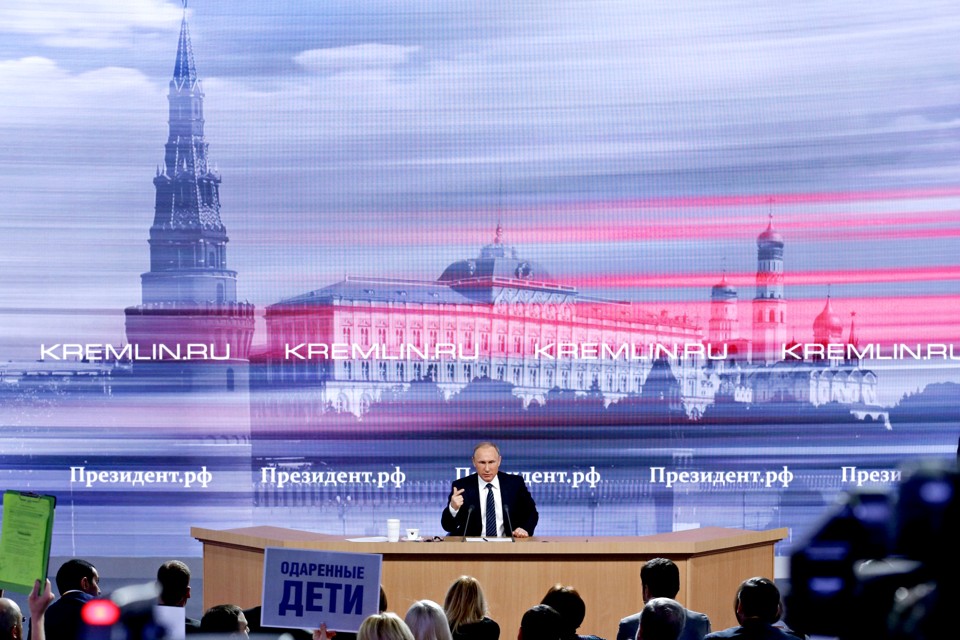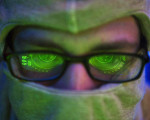PBS: Escaping Eritrea … [Read More...] about ካብ ውሽጢ ቤት ማእሰርታት ኤርትራ
The World According to Russia
Jeffrey Taylor | 30 December 2015 | The Atlantic
A documentary on state television gives a glimpse of Vladimir Putin’s philosophy.

“Do you realize what you have done?” Vladimir Putin demanded at the United Nations in September. The question was a rebuke to the American-led bloc of countries that initially viewed with optimism the Arab Spring, which began five years ago this month, but has since given way to chaos and Islamist violence across once-stable parts of the Middle East and North Africa. Those events, and much else, look different when viewed from Russia than they do from the United States, and a documentary that aired recently on Russian state television helps explain the worldview behind Putin’s question.
The two-hour-plus film, Miroporyadok (World Order), explores, in the words of its narrator Vladimir Solovyov, “what is happening with us [Russians], what sort of world we have inherited from our parents, and what sort of world we will leave to our children.” Partly through interviews with the Russian president himself, it also offers a window on Putin’s own realpolitik perspective, one that I’ve found to be widely shared throughout Russia over many years of living in the country—a worldview according to which international relations consist of competing blocs of nations pursuing their interests, and the violation of sovereignty is a recipe for instability. This stands in contrast to Obama’s own position, which he stated at the UN two years ago, that “sovereignty cannot be a shield for tyrants to commit wanton murder, or an excuse for the international community to turn a blind eye to slaughter.”
Indeed, as the film tells it, the root of all international evils is the American penchant for democracy-spreading, both subtle (via U.S. support for “color revolutions” in the post-Soviet sphere) and overt (as in overthrowing Saddam Hussein). Russian Foreign Minister Sergei Lavrov declares that the Arab Spring was fomented from abroad, disregarding the Middle Eastern region’s widespread popular discontent with official corruption, political stasis, and lack of job opportunities. The United States intervenes despite bitter experience within living memory; the American director Oliver Stone appears onscreen to tell viewers that “America didn’t learn the lesson of Vietnam, which is you shouldn’t go around invading other countries.”
But Putin denies chiding Obama directly at the UN for the consequences of the Arab Spring. “I wasn’t saying this [to President Obama]” Putin tells Solovyov, but to the constellation of leaders, both American and European, who have been meddling in Muslim lands since 2001. “I have always been telling [these leaders] that they have to act carefully. It’s wrong to impose one’s scheme … of ideas concerning good and evil, or in this case, good and democracy,” on countries “with differing cultures, a different religion, with other traditions. But frankly, no one listens, because they apparently consider themselves infallible and great.” No one, he adds, holds those leaders accountable, whatever the outcome. When an “operation” produces the wrong results, Putin says, the (again, unnamed) leaders in question just say, “Oh well. Next!” After all, “They’re great and sitting across the ocean, the dollar is the world’s currency, they have the biggest economy in the world.”
The Wikileaks founder Julian Assange also makes an appearance, citing cables revealing U.S. efforts to undermine the regime of Syrian President Bashar al-Assad—though American officials continue to maintain that Assad must go eventually, the cables in question most likely concern Wikileaks revelations made in 2006. The film shows Syrians lamenting the chaos the presumably American-backed terrorists have unleashed. No mention is made of Assad’s murderous crackdown on the demonstrations that set off the revolt, or of the barrel bombs deployed against civilians to this day at great cost to civilian life, or of the U.S. air campaign against ISIS.
Significantly, though he never rules out cooperation, Putin makes no such overture to the United States. Rather, the film closes with Solovyov asking him the question used to tease viewers in the intro: Will there be war—World War III, in particular?
Probably not, Putin responds, as long as no crazy individual decides to use nuclear weapons and start it. But just in case, “Russia will continue perfecting its [nuclear] weapons. The nuclear triad forms the basis of our security policy. We have never brandished our nuclear bludgeon, and never will, but it retains its proper place and role in our military doctrine.”
The upshot, according to World Order: Putin considers possible a renewed relationship with Europe, but sees no such likelihood with the United States. This is one area where the views from Washington and Moscow aren’t so different—and that is bad news.
Related Story: Brave New War

